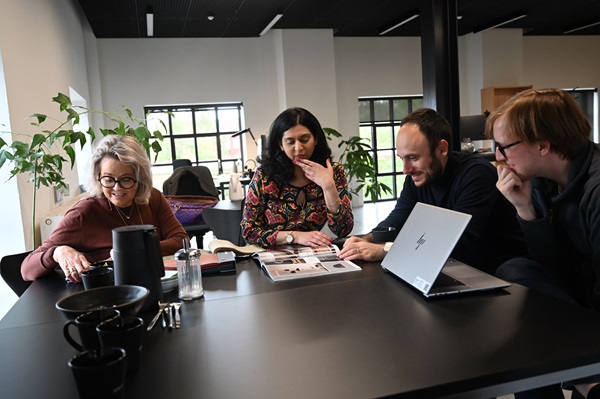
She left New York to enhance responsible AI in Denmark
Dr. Aparna Varde has been appointed the first full professor of software engineering at the University of Southern Denmark’s new campus in Vejle. In both her research and teaching, she is dedicated to ensuring that artificial intelligence is developed and applied ethically.
Here’s a telling fact about Aparna Varde: she doesn’t like to use Google Maps
Having just moved from New York to Denmark, one might assume she would rely heavily on digital navigation to find her way around Odense, where she now lives, or Vejle, where she works as a professor in software engineering and will be teaching at SDU’s new campus.
But she doesn’t.
It’s not just about preserving her memory and aiming to improve her natural sense of direction. It’s also about connecting with people.
- As an American, and especially a New Yorker, I’m used to talking to strangers I meet on the streets. I was told that you can’t do that here in Northern Europe, that people are too reserved, but that hasn’t been my experience at all. People are very happy to help when I ask for directions, she says.
Technology should never replace human connection
The determination not to let technology replace human interaction reflects her broader research philosophy.
- AI should never replace humans. It should assist, support, and help people make better decisions, she says.
Varde has been working with machine learning and artificial intelligence since her PhD days. After spending time as a visiting professor at the Max Planck Institute for Informatics in Germany, she developed a particular interest in explainable and sustainable AI and in integrating commonsense knowledge in AI systems.
- Explainable AI, to me, is about helping humans and machines understand each other. If I tell you that A leads to B, I should also be able to explain why. That transparency builds trust. When models can explain their reasoning, we can trace and correct errors and ultimately trust the system again. That’s a very human quality: not perfection, but the ability to learn and improve, she explains.
As AI reaches more people, the need for transparency grows and so does the importance of reducing its energy consumption.
- On the sustainability side, we need to know when to use AI and when not to. Using large models constantly is not only energy-intensive, but also costly and less accessible. Sustainable AI is about efficiency: achieving the most learning in the best manner with the least data.
From Manhattan to Vejle
Varde earned her bachelor’s degree in computer engineering from the University of Bombay in India before moving to the United States to complete her master’s and PhD in computer science at Worcester Polytechnic Institute in Massachusetts.
She later joined Montclair State University in the greater New York City area as a tenured associate professor and settled down in Manhattan.
Although she describes the move to Denmark as a warm and welcoming experience, there are still a few aspects of New York she misses.
- What I miss most about New York is the 24/7 culture and the fast-paced life. For example, I’m a night owl, and I used to love walking across the street at midnight to buy groceries or just wander around the city for a post-prandial stroll. Here, most shops close early, so that’s something I’m still adjusting to. I also miss my friends – the sense of community, the birthday parties, the multicultural mix. In New York, we celebrated every festival you could imagine, she says.
- But Denmark has its own kind of community spirit – midsummer parties with broad daylight almost at midnight, pumpkin carving in the open air with Scandinavian pancake-making on fire grills, international gatherings where even the mayor of the city meets and mingles with us – and I’m enjoying discovering all of that.
A new campus and a new mindset
Varde’s motivation for moving to Denmark was, above all, the opportunity to help shape a brand-new university campus.
- We have a unique chance to build something from the ground up. I love that we collaborate across disciplines and faculties, and I hope we can create not just a range of study programmes, but a mindset where responsible AI, sustainability, and creativity go hand in hand, she says.

She already has ideas for courses she wants to teach when the first engineering students begin their studies in Vejle in the summer of 2026.
- Everyone talks about deep learning these days, but AI is so much more than that. I want to teach courses that cover aspects of explainable AI, sustainable AI, and using generative models responsibly. It’s not about asking an AI tool such as ChatGPT to do everything; it’s about understanding when and how to use it, she says.
- For today’s students, it’s crucial to keep their analytical and creative skills sharp. You can’t simply command an AI system and expect to learn. You have to understand algorithms, complexity, and the logic behind them. You must learn software development with a good combination of core programming and AI guidance. Otherwise, you’re only consuming technology, not creating it.
- It is important to note as we build smartphones and smart cities and smart nations, we must also nurture smarter people!